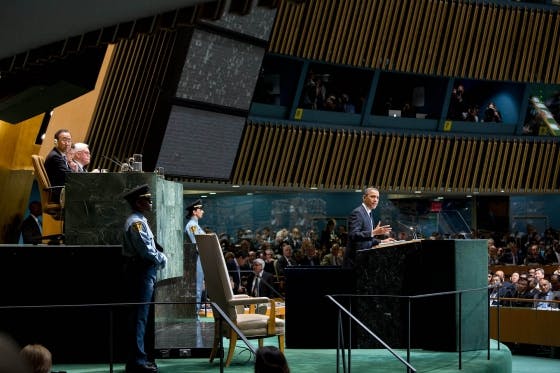Why the UN Asked International Court for an Opinion on Israel
The aim is to undercut American support for the Jewish state.

The International Court of Justice confirmed on January 20 that it had been formally requested by the United Nations General Assembly to issue an “advisory opinion” on “Israeli practices and settlement activities affecting the rights of the Palestinian people and other Arabs of the occupied territories.” The Assembly passed a resolution on that head on December 30.
The venerable International Court of Justice — created in 1899 and remodeled in 1946 within the framework of the United Nations has jurisdiction by power of consent only: its decisions in arbitrated questions are not binding per se, but rather only insofar as the parties agree to follow them. They are frequently, if wrongly, supposed to be the final word in international law, and may thus provide a veneer of respectability, by a circular logic effect to political maneuvering.
All the more so its “advisory opinions.” This is what the December 30 resolution’s backers intend to do: building on the court’s pronouncements, whatever their actual content, scope and validity, to consolidate an alternate pro-Palestinian legal reality where Israel will be gradually suffocated. A long history lurks behind all that.
It started with the Arab denial of Israel, from the rejection of the UN plan to partition Palestine in 1947 to Anwar Sadat’s visit to Jerusalem in 1977. No matter what happened on the ground (the Jewish State’s military victories, its demographic and economic growth), the Arab states kept then insisting she was not a State but a mere “entity,” soon to be dismantled. To support their case, they began filing against Israel as many resolutions as possible at the UN.
As the Cold War set in, and as the European colonial empires gave way to new independent states in Asia and Africa, their stand was condoned at the UN and other international organizations by growing numbers of non-Arab countries: the Soviet and its vassals, the other Communist states, from Tito’s Yugoslavia to the People’s Republic of China, North Korea, and Vietnam.
Plus, the so-called “non-aligned nations” in the Third World. Eventually, even the African nations, that had been globally friendly to Israel in the 1960’s, joined the move.
A two-thirds majority “automatic majority” at the UN and other international organizations would thus repeatedly pass outlandish resolutions against the Jewish State throughout the 1970’s and 1980’s — and claim, inasmuch as Israel would refuse to countenance or implement them, that she was “violating international law.” Support for Israel (and sanity) came almost exclusively from the West at that time.
Anti-Israel harassment was slowed but not halted after the fall of Soviet Communism and its allied regimes in the early 1990’s. Indeed, the most outrageous anti-Israel UN General Assembly resolution — the “Zionism is Racism” resolution of 1975 — was rescinded by a transformed General Assembly in 1991: ninety nations who had approved the 1975 resolution agreed to get it canceled.
To this day, this is the only instance where a UN resolution has been revoked.
What prevailed in most cases was sheer inertia. Since 1977, one Arab state out of two has signed a peace treaty with Israel or engaged into a de facto normalization. Many Arab States have even entered into an “Abrahamic” strategic alliance with the Jewish State. For all that, they still vote routinely for every anti-Israel resolution at the UN or the UN agencies.
The same is true, by and large, of such post-Communist Russia and Communist China, and a majority of the former “Third World” countries.
Nor has the volume of anti-Israel bashing decreased in any way. In 2022, the Assembly passed no fewer than 16 resolutions on the Jewish State only, against 13 on the rest of the world (including Russia, in relation to the Ukraine war, Syria, Iran, and the United States, for not lifting its embargo on Cuba).
As UN Watch recently observed, no resolution was passed “in 2022 on the human rights situation in China, Venezuela, Saudi Arabia, Cuba, Turkey, Pakistan, Vietnam, Algeria” and many other problematic places.
Talleyrand famously said that everything which is exaggerated is meaningless. Yet, the Israelis take UN exaggeration seriously. The more UN anti-Israel resolutions are being passed, the less they are being critically reviewed and exposed for what they are.
Even the United States, arguably the most law-intensive nation in the world, has difficulties dismissing as legally aberrant the UN General Assembly-endorsed contention that the 1949 ceasefire lines (the “green line”) should retroactively be seen as an international border between Israel and “Palestinian occupied territories” or that Jerusalem is not the capital of Israel.
One may thus reach a point where the alternate anti-Israel narrative will simply be taken for granted, and steps will be devised at international level against “rogue State Israel.” General Assembly resolutions are merely declarative. Not so UN Security Council resolutions, which may lead to economic sanctions, judicial harassment, and military options.
So far, the United States has usually vetoed such moves against Israel. Yet as American leaders and diplomats get more and more confused about the real issues involved, especially under wokeish administrations, they may get more and more reluctant to use their veto.
There is one ominous precedent: on December 23, 2016, the outgoing Obama administration declined to veto Security Council resolution 2334, according to which Israel’s presence in “East Jerusalem” has been illegal since 1967.
This resolution was disregarded by the Trump Administration in 2019 as it implemented the United States Congress decision to transfer the American Embassy to Jerusalem from Tel-Aviv. But it is still on the UN books.
An ICJ negative “advisory opinion” on “Israeli occupation” may be seen by some activists at the Department of State or the White House as an even greater opportunity to get rid of the United States commitment to Israel’s security.

